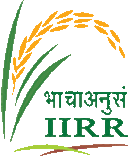- ICAR-IIRR has been at the forefront to host, train and guide Indian as well as international research scholars. ICAR-IIRR supports post-graduate research programs to NARES across disciplines. As of now, this institute has hosted 150 doctoral and post-doctoral research scholars and more than 300 master's research scholars. ICAR-IIRR has been also hosting training and internships for graduate-level students.
- With the revised guidelines from ICAR for hosting research scholars, we have a new frame work document designed fee structure and payments.
REVISED GUIDELINES
- ICAR-IIRR has an exemplary high-grade scientific environment and standards for the budding researchers. ICAR-IIRR has well established field facilities, sophisticated instrumentation facilities for all the sections viz. crop improvement, crop production, crop protection, transfer of technology, agricultural engineering.
Field facilities
ICAR-IIRR has well designated field facilities lowland and upland according to rice ecosystems. ICAR-IIRR has nutrient gradient field plots i.e. low nitrogen and recommended nitrogen fields plots, low phosphorus and recommended phosphorus. The field plots are maintained without application of the nutrient for which the screening needs to be done. Aerobic dry direct seeded plots, a controlled nematode screening sick plot is also maintained. Hybrid rice seed production, thermal screening, low light intensity screening facilities are also maintained. Glasshouse screening facilities for rice diseases / pests are available and maintained. Biotic and abiotic stresses resistance/ tolerance controlled screening facilities are available.
Laboratory facilities/ Instrumentation
ICAR-IIRR is well equipped with state-of-art facilities.
Guidelines for student internship programs at IIRR (M.Sc/Ph D/others)
- In case of students, irrespective of PhD/MSc/Intern/Trainee, whether short term or long term, a request letter from the concerned university/institute should always be sent to the Director, IIRR, instead of the individual scientists. No individual requests should be entertained by the scientists from any agency/Institute. The Academic committee will process all the applications and get the final approval from the Director, IIRR before admission.
- The student who is admitted to undertake MSc/PhD research work should submit a copy of ‘Outline of Research Work’ (ORW) before starting the work in the department concerned.
- Students pursuing Ph.D. degree need to give a seminar on their research work prior to submission of their thesis.
- Applications for Research Fellowships/ SERB/ INSPIRE Etc. should be submitted through the Head of the section to the Academic committee/ PMEC for approval of the Director.
- Approval of DARE-ICAR/ Council is necessary for mentoring Foreign Students irrespective of their sponsorship and funding. Their applications should be submitted 3 months in advance for obtaining approval from DARE-ICAR.
- As per the ICAR guidelines the IP rights of the admitted students rest with IIRR and so the students will have to submit their lab/field data books/workbooks having raw data/methods/ procedures to their respective supervisors. As per the guidelines, due credit should be given to the concerned students in publications/reports etc. Any dispute arising out of the students research work will be resolved as per the ICAR Guidelines.
- Students should submit a copy of final thesis (soft and hard copy) to the IIRR, Library through the supervisor with intimation to PMEC/Academic committee after finishing final viva.
- A temporary Identity Card signed by the competent authority shall be issued to students admitted to do their research work at IIRR Laboratories.
- As per the ICAR guidelines, the students interested in pursuing their graduate/post graduate/others research work leading to dissertation/thesis/training/internship outside the NARS should pay the prescribed fees to IIRR after approval their application by the Director, IIRR as mentioned below:
1. M. Sc /M.Tech Dissertation work : Rs. 30,000/-
2. Ph. D thesis work : Rs. 30,000/- per semester
3. BTech/M.Tech/MBA/MCA work : Rs. 20,000/-
4. Other Internship/ Trainings : Rs. 10,000/- upto 3 months
For Student internship programs contact us at – Chairman, Academic Committee, ICAR-IIRR, Rajendranagar, Hyderabad-50, Email : यह ईमेल पता spambots से संरक्षित किया जा रहा है. आप जावास्क्रिप्ट यह देखने के सक्षम होना चाहिए.




